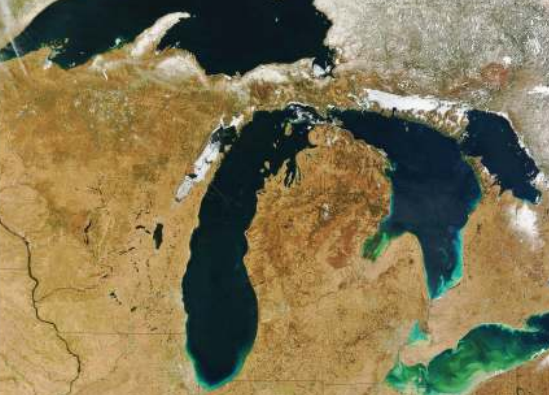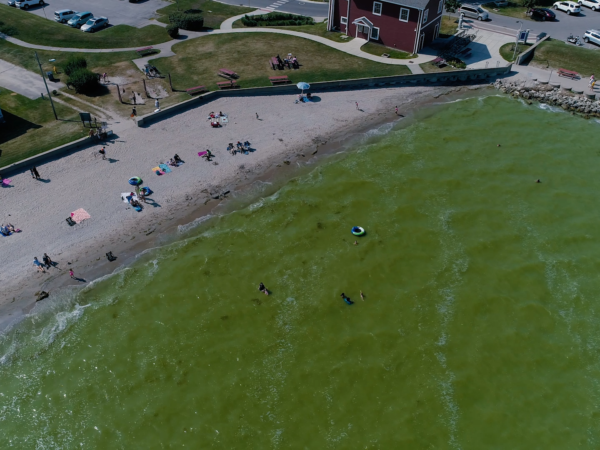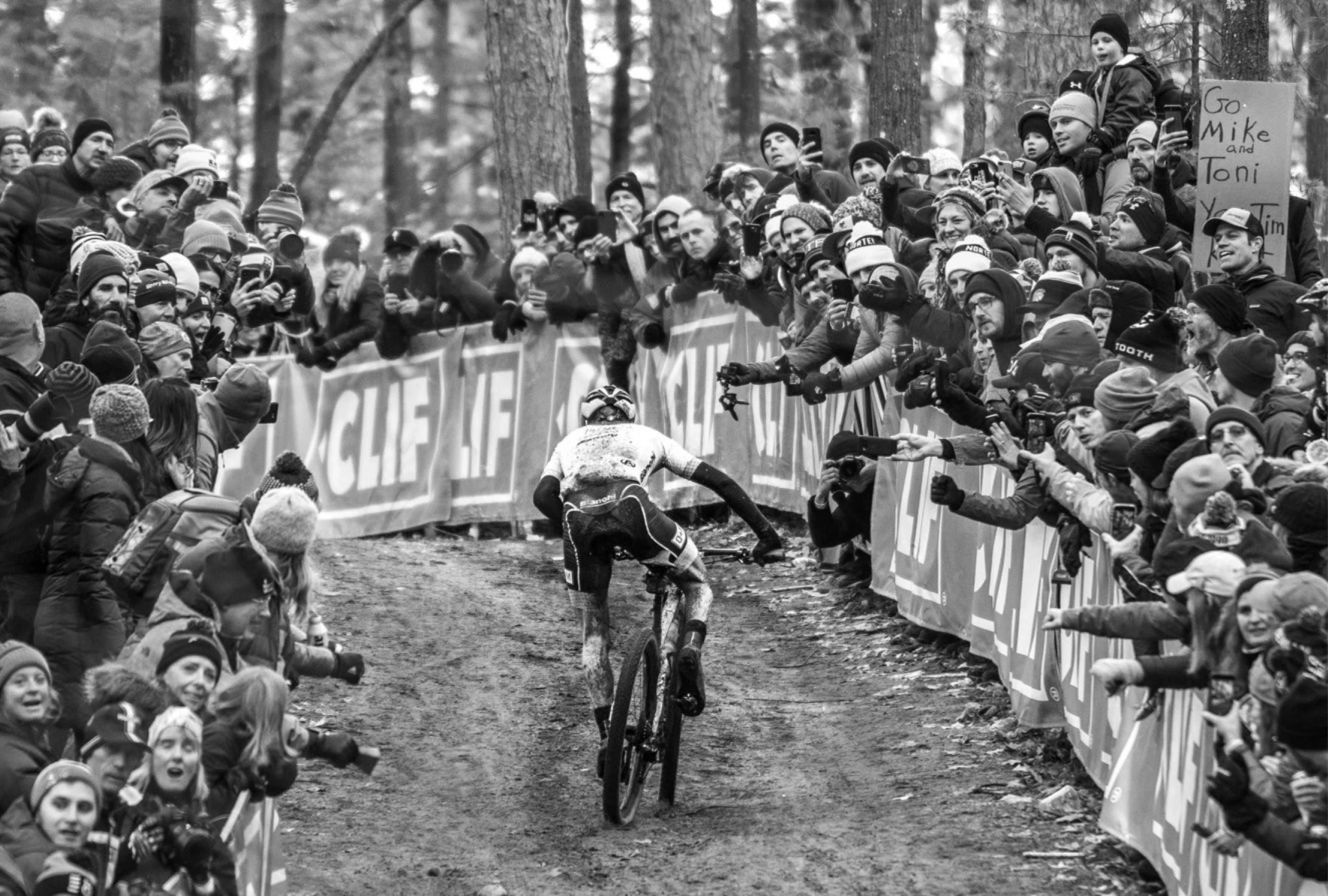
By Ellie Katz
Points North is a biweekly podcast about the land, water and inhabitants of the Great Lakes.
This episode was shared here with permission from Interlochen Public Radio.
Every November, mountain bikers flock to the woods of northern Michigan for the Iceman Cometh Challenge, a 30-mile mountain bike race that starts at a small town airport, cuts through steep forested hills, and ends at a campground.
This year, professional cyclists from all over North America are lined up at the starting line: racers from Quebec, Virginia, Utah, Colorado. But two of those pro cyclists — Brian Matter and Alexey Vermeulen — are both from a small town in southeast Michigan.
Brian Matter is the Iceman. He’s won this race more times than any other pro male cyclist in its 35-year history. Alexey Vermeulen grew up idolizing Brian, and riding the same trails he rode.
Now, Alexey’s at the top of his game, and he’s gunning to break Brian’s Iceman record — and set a new one.
Credits:
Producer: Ellie Katz
Host: Dan Wanschura
Editor: Morgan Springer
Additional Editing: Ed Ronco, Peter Payette, Dan Wanschura
Additional Production: Max Copeland
Special Thanks: Steve Brown
Music: Blue Dot Sessions
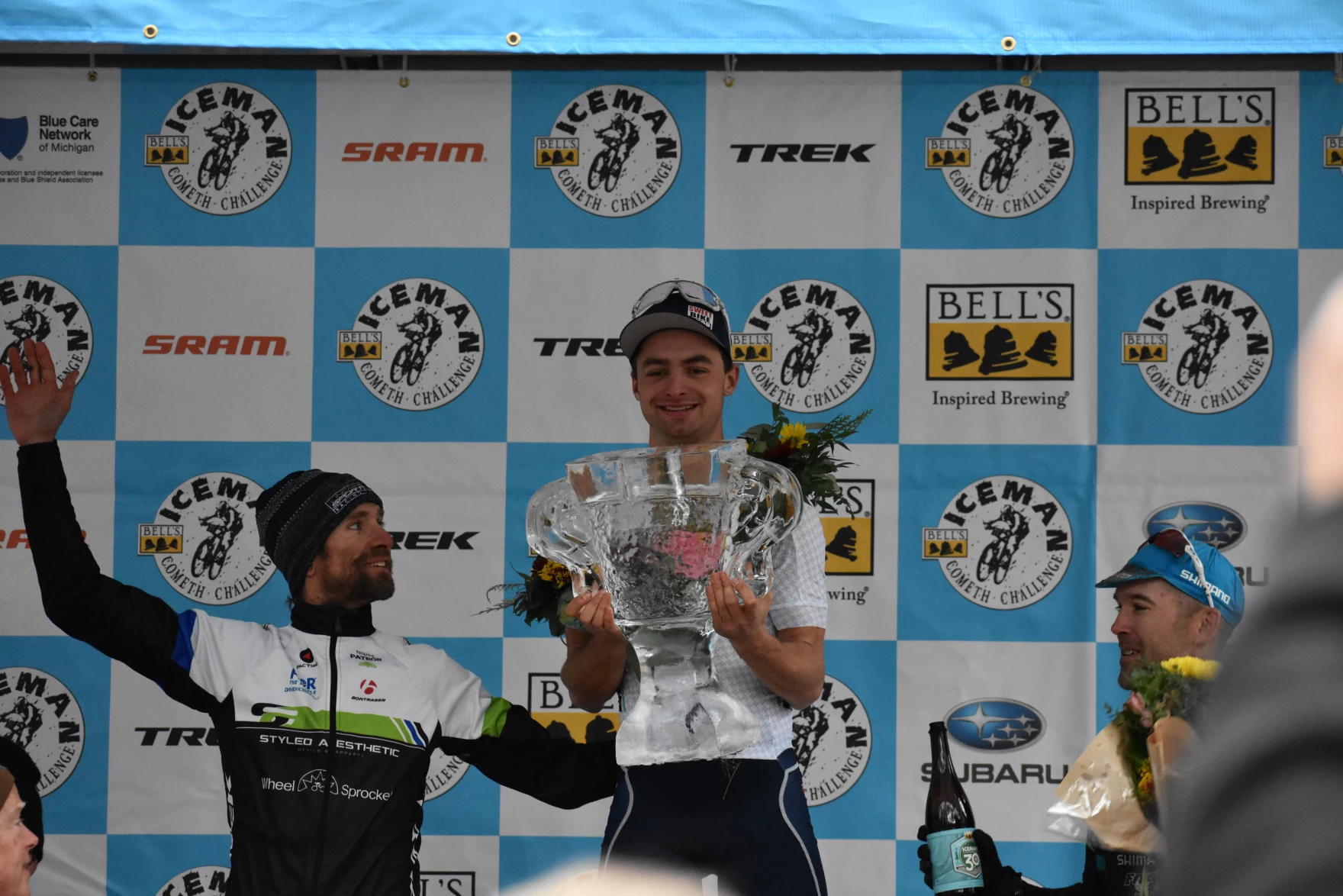
Alexey Vermeulen, center, holds the ice trophy after his win in 2019. Brian Matter, left, came in second place that year. (credit: Avery Stumm)
DAN WANSCHURA, HOST: This is Points North, a podcast about the land, water and inhabitants of the Great Lakes. I’m Dan Wanschura.
There’s one day every year where a hill in the woods of northern Michigan goes from sounding like this.
(sounds of birds chirping, leaves rustling)
WANSCHURA: To sounding like this.
(sounds cowbells, cheering, screaming)
WANSCHURA: This is Icebreaker Hill on race day.
Icebreaker is the last big hill in the last mile of the last major mountain bike race of the year in the U.S.: the Iceman Cometh Challenge. For professional mountain bikers, Iceman is the final chance to win big each season. And Icebreaker Hill — it can make or break you.
BRIAN MATTER: If you’re feeling good and you’re in contention for the win, like you’re feeling nothing. You’re in the zone, you hear the noise of the people. You’ve planned what you’re going to do, and you make your move. And that’s it.
(sounds of of bike gears shifting, heavy breathing)
MATTER: If you are in trouble … and you’re completely suffering and the gap is opening, you probably know, you know that that was not your year. … That’s the moment, right then.
WANSCHURA: Racers are here from all over North America: Quebec, Virginia, Colorado, Utah. And then there are these two guys from the same small town in southeast Michigan. Their names are Alexey Vermeulen and Brian Matter.
ANNOUNCER 1: Thousands of people literally here in front of me making noise. Oh, my God. This is Iceman, and it is fantastic.
ANNOUNCER 2: All right. Who’s it gonna be? Alexey, Jordan, Brian?
WANSCHURA: Brian is the Iceman. He’s won this race more times than any other man in its 35-year history. And Alexey is gunning for that title.
ANNOUNCER 1: How many of you think it’s gonna be Alexey Vermeulen for a fourth time–
ANNOUNCER 2: Oh my gosh. Who is that?
ANNOUNCER 1: Oh my God, I don’t know. Hold on.
WANSCHURA: Ellie Katz picks it up after the break.
(sponsorship message)
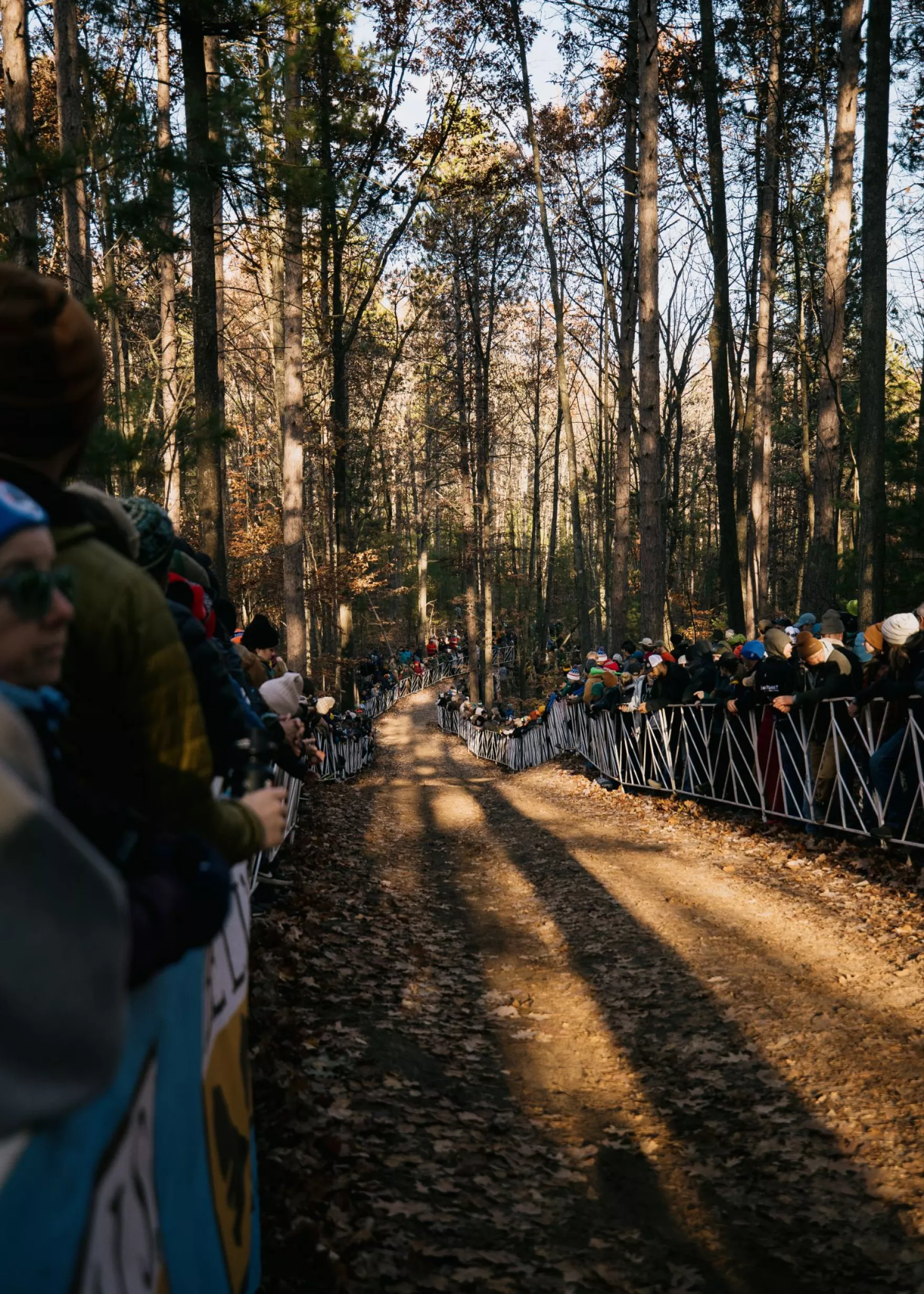
The view from the top of Icebreaker Hill. (credit: Joshua Strong)
ELLIE KATZ, BYLINE: This is a tale of two cyclists. The first cyclist is a little older, a little past his peak performance days. But he’s a legend.
KATZ: Do you ever introduce yourself as the Iceman?
BRIAN MATTER: No.
KATZ: Can I get you to do that?
MATTER: My name is Brian Matter, and I am the Iceman.
KATZ: And what does that mean?
MATTER: I don’t know what that means. I mean, that sounds pretty weird. That’s the first time I’ve ever said it but–
KATZ: Whatever image you have of the Iceman, Brian, like most professional mountain bikers, is pretty slender, kinda wiry. And he’s 46. Which is a lot older than most of his competition these days. But back in the day, when Iceman first started in 1990, Brian was a kid from Pinckney, Michigan, a small town 30 minutes from Ann Arbor. Pinckney’s got this big recreation area full of lakes and trails – where Brian would mountain bike with his friends. As teenagers, they’d caravan up north every fall to race Iceman.
MATTER: The atmosphere was full party mode, like, nobody was serious. Nobody had, like, the high end bikes or high end clothing. It was just like … go and kind of the first one to get back to Traverse City wins.
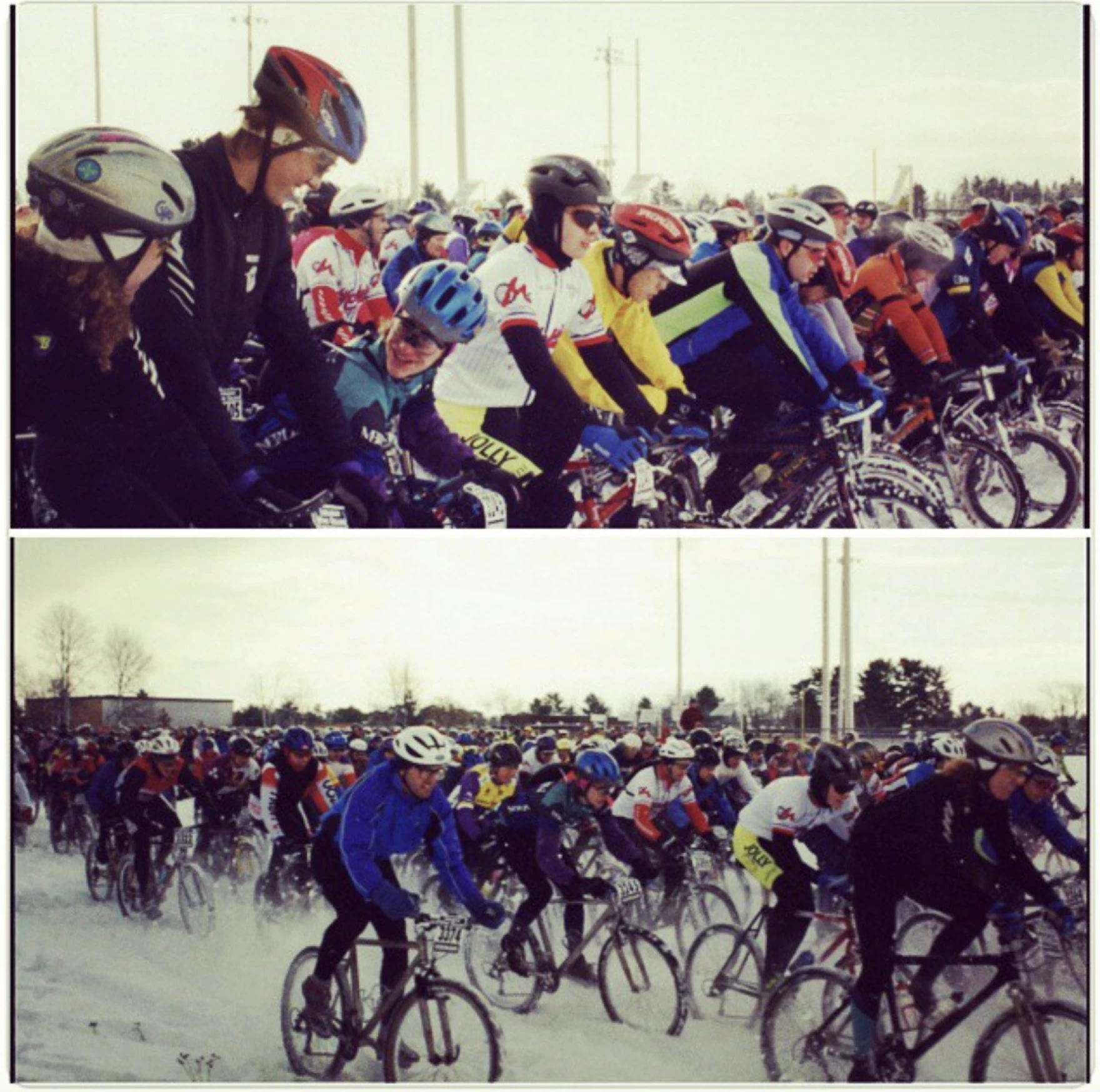
The early days of Iceman. (courtesy: Brian Matter)
KATZ: Iceman is kind of in the middle of nowhere. You start at a small-town airport in northern Michigan and ride 30 miles through the woods to end up at an RV campground. It’s always the first weekend of November, so the weather is a toss-up. And for a while, Iceman was just this fun, competitive ride for Brian. But as he got older, he got better. He turned pro and he started winning the race. Once, then twice, then three times. Then in 2014, he made history at Iceman.
ANNOUNCER: Four, three, two, one!
MATTER: Conditions were absolutely horrible that day. … It’s like you’re on ice skates, and you’ve never been on ice skates before, so every little bit of the trail becomes extremely challenging, and you never know when the guy in front of you is going to crash when the guy behind you can’t stop and runs into the back of you. So it makes the racing much more dynamic.
KATZ: It’s less about who can pedal the hardest, and more about who has the best skills, the best strategy. Brian’s in the lead group most of the time. In the final kilometer, the dirtbike that goes ahead of the pros is kicking up tons of mud.
MATTER: The fans didn’t even know who I was … because I was pretty much covered in black dirt.
(sounds of cheering, cowbells)
KATZ: There’s people crowding around the bottom of Icebreaker Hill – that last big hill in the race. It’s drizzling. You can see their breath in the cold. There’s flags and cowbells. Brian makes it to the finish line just a few seconds ahead of another guy, holding up four fingers, for his fourth win.
MATTER: It’s so loud you can’t hear anything. There’s so many fans there cheering. But I remember going over this little little bump and almost crashing as I’m doing my victory salute.
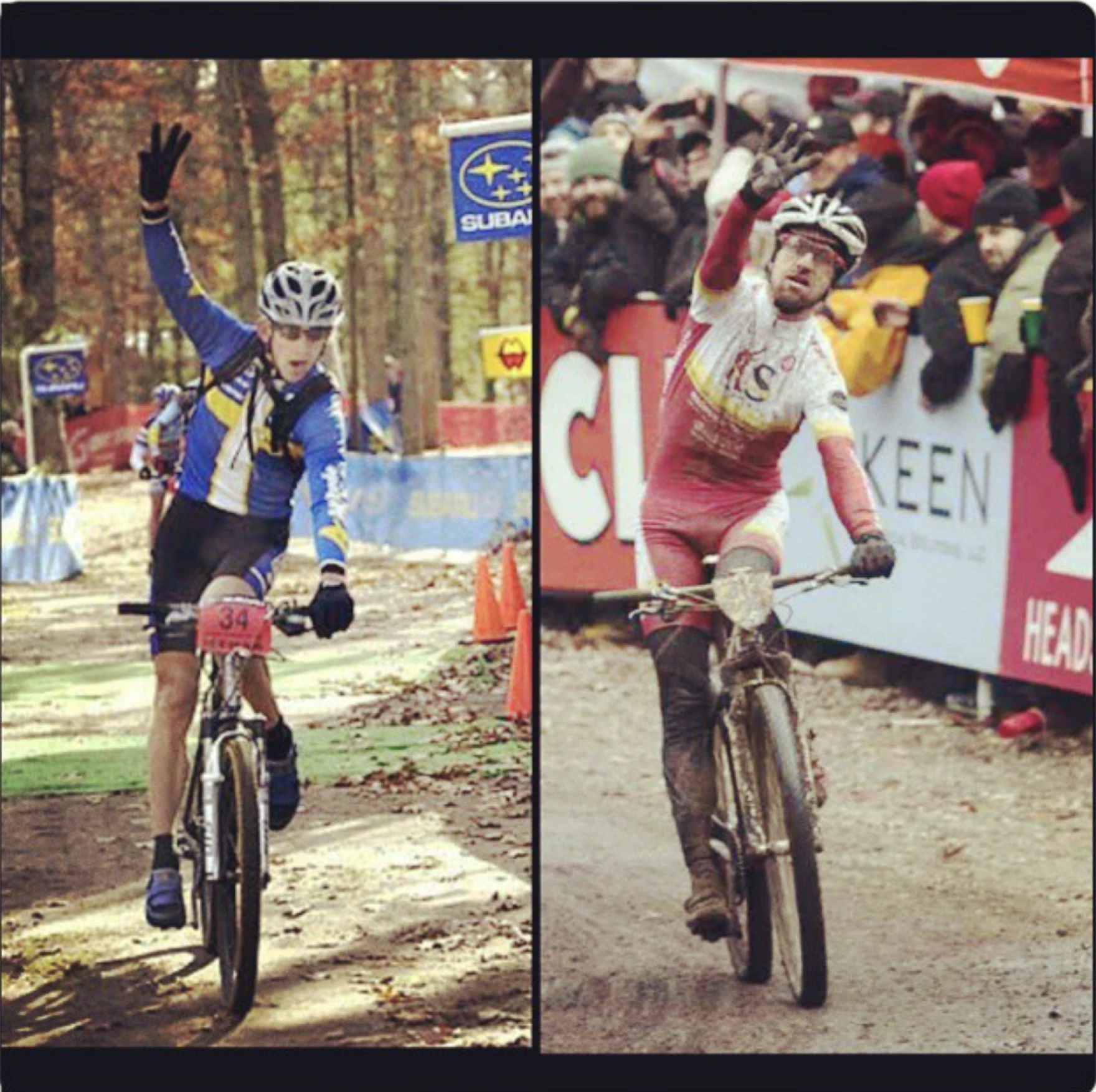
Brian Matter victory salutes after his third and fourth Iceman wins. Matter is the only professional male cyclist to have won Iceman four times. (courtesy: Brian Matter)
KATZ: This fourth win crowns Brian as the Iceman: the pro man with the most wins, at least until someone else can come along and unseat him with five wins. Brian kept riding at Iceman and a bunch of other races across the country. And a couple years later, he started to hear this rumor in the cycling world about a guy from his hometown.
MATTER: I had heard there was a World Tour road racing pro from Pinckney, Michigan. And, you know, Pinckney is a small town, 2,000 people in southeast Michigan, and to hear that there’s a World Tour pro from Pinckney, it just kind of blew my mind.
KATZ: The World Tour is the highest level of professional road cycling. Most of the major races are European – like the Tour de France. And it’s really hard to make those teams as an American cyclist.
MATTER: So back in the day, on Twitter, you know, I sent a message: “Can anybody confirm, you know, tagged Alexey, is from Pinckney, Michigan,” and he responded, and that kind of started our relationship.
KATZ: Alexey Vermeulen: the guy who was coming for Brian’s record, the young guy coming for the old guy.
ALEXEY VERMEULEN: Like, he’s not my dad’s age, but he’s closer to my dad than he is to me. I don’t mean that badly, Brian.
KATZ: Alexey’s first serious ride on a road bike was when he was 12.
VERMEULEN: We did a big ride with my grandfather who … kind of got me into the sport. And he just kept saying, it’s a little further, it’s a little further. We’re just going for ice cream. And the last, like, 10 miles, I completely fell apart.
KATZ: Alexey’s got this kind of frenetic energy: He moves around a bunch when he talks. By the time he was a teenager, his big dream was to become a professional road cyclist, which meant making it onto a hyper-competitive team in Europe. And when he was 21, after years of training, Alexey finally got his chance.
VERMEULEN: All of a sudden it was, it was like being in the NHL. It’s just professional, right there. You’re getting massages, people [are] picking you up from the airport. There’s mechanics, there’s the bus that we go into the start. Like, it’s real world.
KATZ: But things weren’t going great. His results weren’t where they needed to be. And the team ended up cutting him. So he came back home to Michigan in the summer of 2018. And he realized he had one last shot at staying pro – not as a road racer, but as a mountain biker instead. He decided he wanted to go to Iceman that fall, make it onto the podium and attract sponsors. Brian was his hometown hero, so he called him for help.
MATTER: He was new to the world of mountain biking. So, you know, he would maybe ask for some equipment advice. What equipment are you using? What tires are you using? Suspension setup? … you know, I’m looking to change from the road to the mountain biking, and I want to kind of break into this scene so as much as possible. You know, I just tried to be, you know, a good person, a good friend. Welcome him to the sport.
KATZ: So Alexey took that advice – and trained nonstop in the runup to the race. And finally, the weekend comes. It’s a cool day. Kind of overcast.
ANNOUNCER: Five, four, three, two, one!
KATZ: Alexey’s got the course in his mind. He knows where he wants to try and break away. He’s in the front group with about 10 miles left.
VERMEULEN: So I just came in really fast and hit it hard, and … And the next time I looked back, I was like, that’s the race.
KATZ: He’s pumped as he crosses the finish line in second — his hands are outstretched high-fiving fans.
(sounds of cowbells, cheering)
KATZ: Brian comes in third that year 15 seconds behind Alexey. At this point, Brian’s like:
MATTER: Like, ‘Okay, I’ve helped him enough. He’s plenty fast. He can pedal really hard. I think he’s got it. I think he made it.’
KATZ: And Alexey did have it. He went on to win Iceman in 2019. Then in 2022. And again in 2023. Which meant he finally got to hold the famous Iceman trophy.
VERMEULEN: This ice trophy is iconic. It’s something that’s like, so, so, so, so, so special. … It’s a block of – they carve a three-by-three foot block of ice into an ice trophy … you need gloves to hold it up. … It’s beautiful, because in sport or competition, at least, you win all these things that people treasure. You walk into someone’s house who’s done 100 marathons, they have every medal. You walk into, you know, into my parents house, they have all, my swimming trophies, to my soccer trophies … This ice trophy is special because it just melts in your hands. You get to experience it in that moment … but you can’t hold on to it.
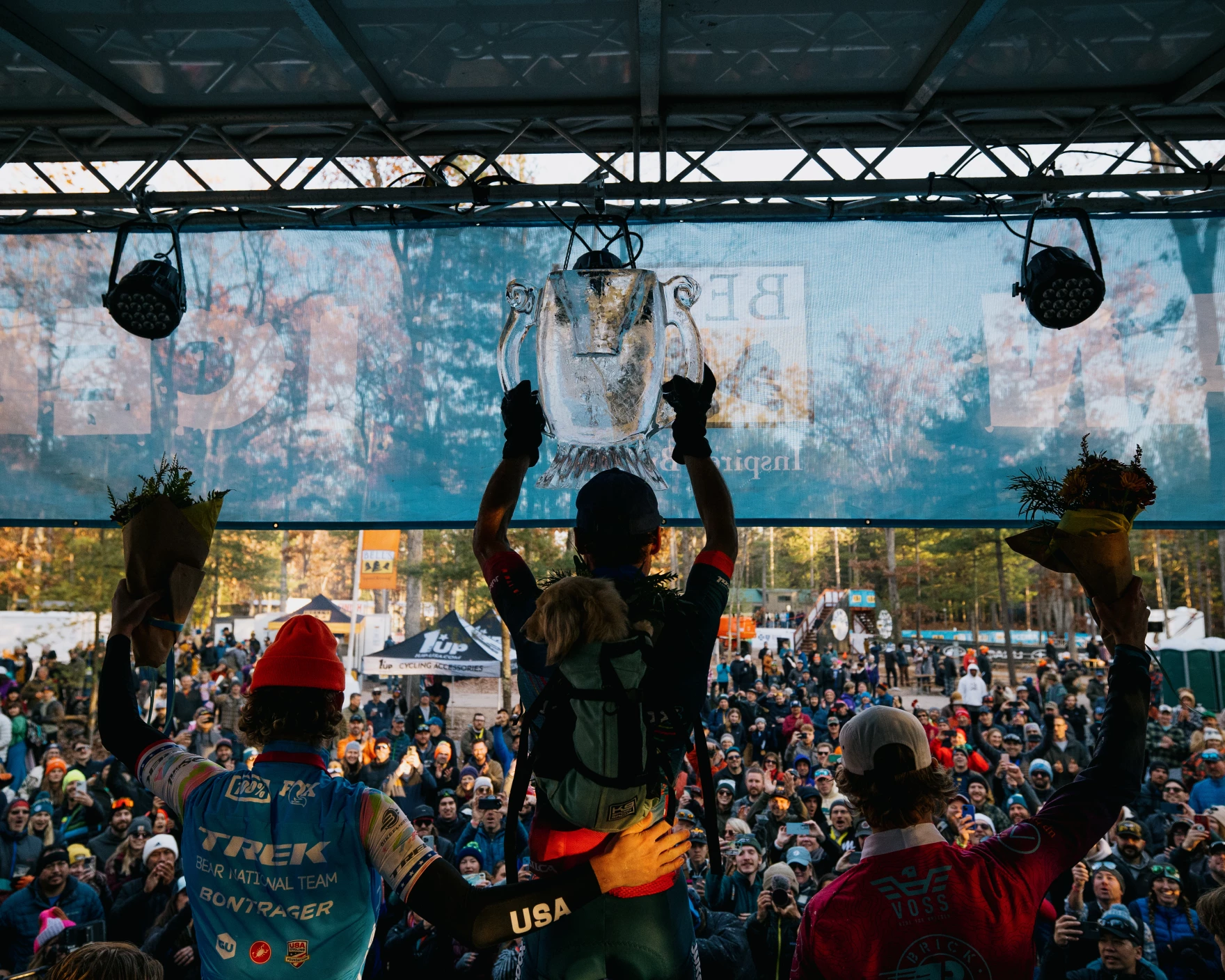
Alexey Vermeulen’s third Iceman win in 2023. (credit: Joshua Strong)
KATZ: In 2023, Alexey joined the ranks of a handful of other male pros who’ve won Iceman three times. But now, he has his sights set on something new: unseating Brian, Becoming the Iceman. On paper, the odds are in Alexey’s favor. He’s one of the best mountain bikers in the U.S. right now. And Brian — Brian’s the underdog these days. But he’s used to that.
MATTER: Like, I’m Brian Matter from Pinckney, Michigan. I’m not — never a national champion, not an Olympian. And many times when I’ve showed up to the start line, I’m racing national champions and Olympians and all these other guys who’ve had significantly better results than me. … But I’m getting old, and there’s nothing I can do about that. … As I get older, I start to think, ‘Man, what if I can’t win it again?’ … But then I think … ‘Hey, like you’re not too old, you can win this thing. And every chance you get to do Iceman, you gotta make the most of it.’ Because it might be my last opportunity — you never know.
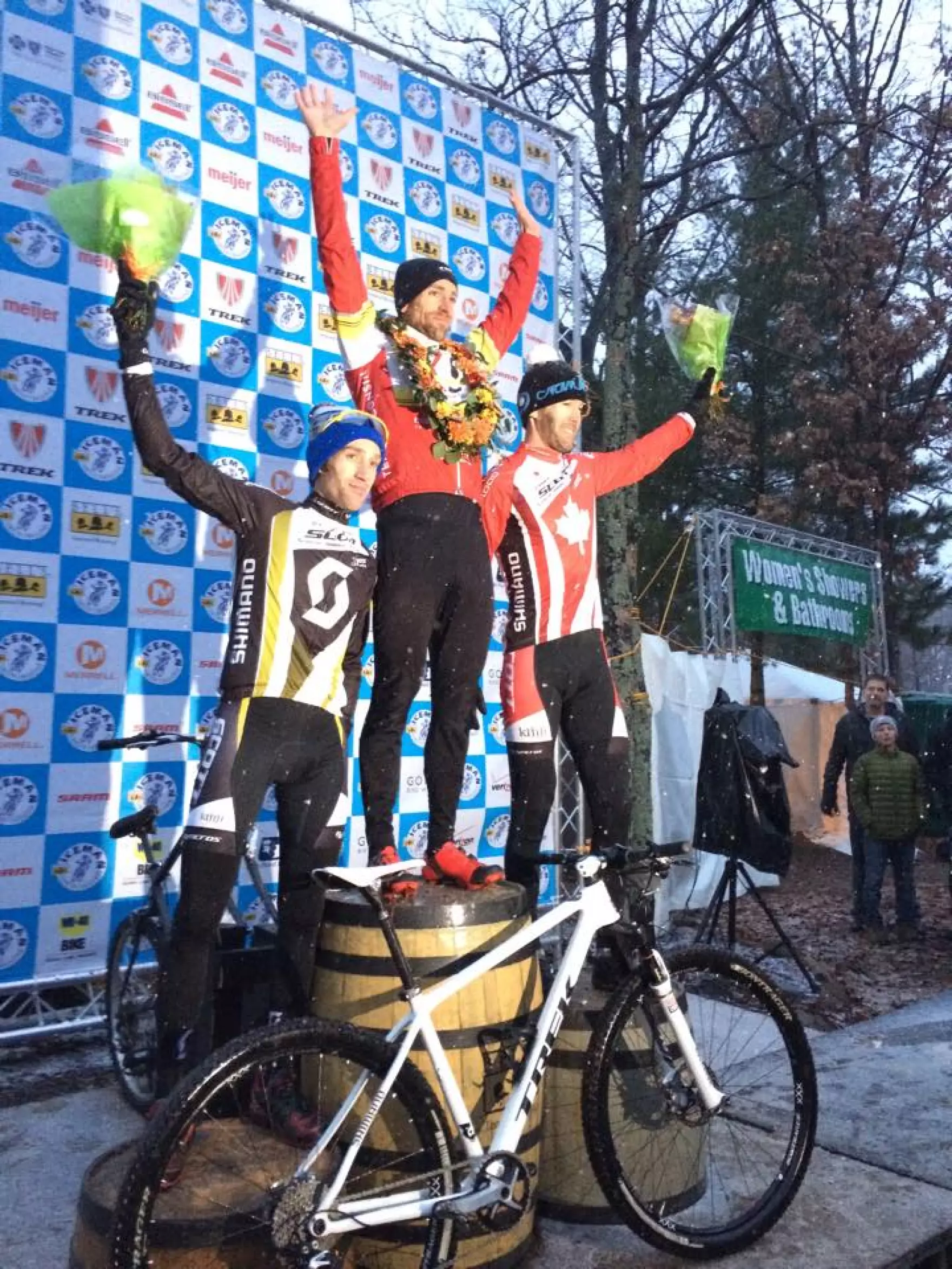
Brian Matter’s fourth Iceman win in 2014. (courtesy: Brian Matter)
VERMEULEN: At Brian’s age, I should not be worried about him, but I am. You just never know what he has coming, what’s up his sleeve. He’s like the magician. You won’t see him all day, and then all of a sudden, he’ll be coming into the final of the race. You’re like, ‘God dang it. Brian’s still here.’ And you just don’t know what he has inside of him.
KATZ: He’s got the spirit of the Iceman inside of him: This folklore that Alexey grew up idolizing — that he still idolizes.
VERMEULEN: Brian epitomizes everything that is Iceman. … Even though I have gotten closer to him with the quantification of wins, it doesn’t feel like I’ve gotten any closer to how good Brian is at riding Iceman. And there’s that weird, like, grasping at air that I’m just never actually going to get to him.
(sound of announcer fades in)
ANNOUNCER AT START: Men’s Pro 35th Annual Bell’s Iceman Cometh Challenge!
KATZ: It’s 3pm on race day. It’s a gorgeous day for November – 55 and sunny – what racers call a “Niceman” instead of a true Iceman.
ANNOUNCER AT START: Let’s give a good sendoff. Here we go. We’re at five, four, three, two, one – go!
KATZ: The course is dry and packed down. So it’s gonna be a fast race. Alexey and Brian are both lined up in the front row on opposite sides.
ANNOUNCER 1: They’re off and rolling.
ANNOUNCER 2: There’s Alexey Vermeulen.
ANNOUNCER 2: Not a great start, but you don’t win this race at the start.
ANNOUNCER 1: No, definitely not.
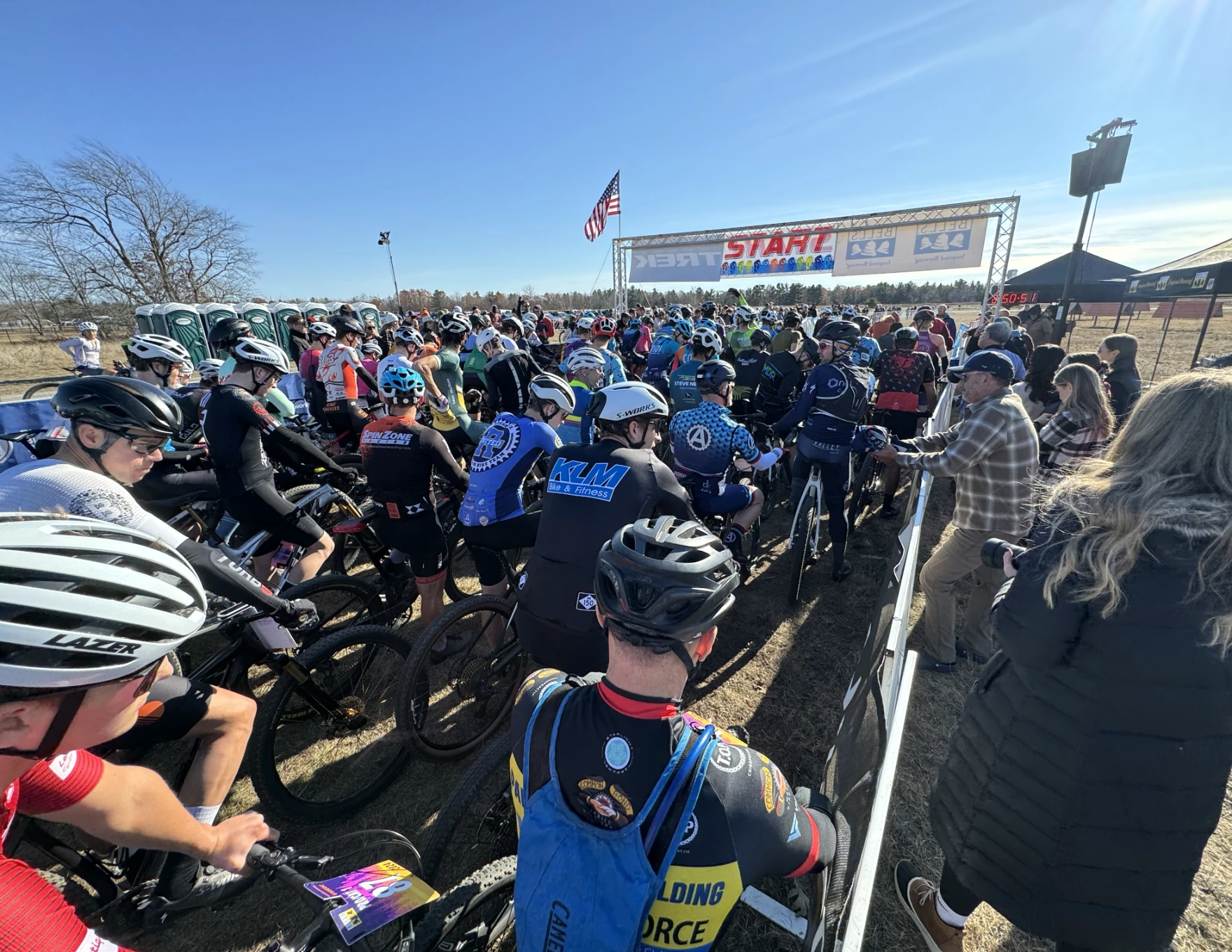
Cyclists in the professional men’s category line up to race Iceman in 2024. Iceman is one of only a few races in the country where professionals race after amateurs. (credit: Max Copeland)
KATZ: They take off down the airport runway before they get to the trail.
ANNOUNCER 2: Look at the dust!
KATZ: Everybody is hitting the gas. It’s full speed ahead. The fastest pros are averaging 19 miles an hour – almost double the speed of the average amateur rider. About a half hour into the race, Alexey’s in front. Brian is a couple places behind him. They come up the first steep hill in the race, called “Make It Stick,” where every year, there’s a guy playing drums.
(sound of drumming fades in)
KATZ: Fans are screaming. They’re handing out shots at the top. Someone has built a jump over the course, so other bikers are jumping over the pros as they race up the hill. A few miles after that, Brian gets dropped from the lead group. He’s way behind for the second half of the race. Alexey’s up front. But with just a few miles left, Brian makes a move, and manages to get back up front near Alexey. They start the ascent up Icebreaker Hill, that last big hill in the race. Alexey is in second. Brian is a few riders behind.
ANNOUNCER 2: All right. Who’s it gonna be? Alexey, Jordan, Brian?
ANNOUNCER 1: Man, those are three Michigan guys, right? So I don’t know. How many of you think it’s gonna be Alexey Vermeulen for a fourth time–
ANNOUNCER 2: Oh my gosh. Who is that?
ANNOUNCER 1: Oh my God, I don’t know. Hold on.
KATZ: All of a sudden, Alexey comes around a tight corner and the guy behind him clips his back wheel. He slips a little, puts a foot down really quick, but keeps going. The guy in front breaks away just before Icebreaker Hill, opening up a big gap.
ANNOUNCER 2: Is that Noah Ramsay? Oh my gosh, it’s Noah Ramsay! From Toronto. Holy smokes! Not a Canadian!
ANNOUNCER 1: Oh my God, he has a sizable gap.
KATZ: Noah sprints up Icebreaker. He’s way ahead. And no one can catch him.
ANNOUNCER 2: Holy smokes! Breaking away and holding off the whole field! [inaudible] Here in Traverse City – Noah Ramsay, the young Canadian! Oh my gosh! Not again! A slight slide out, but he has a decent cushion coming in. Noah Ramsay, Noah Ramsay!
KATZ: Noah Ramsay, a 22-year-old from Toronto, wins. Alexey comes in fourth. Brian comes in sixth. I find Brian at the finish line.
MATTER: Not the best, not the worst. I’ll take it. … To get dropped, and then mentally, feel like you’re out of it, and then all of a sudden, get another opportunity to race again, like I’ve never been in that situation at Iceman before. I’ve always been in the front, so little bit of a shock to the system, racing that fast, but that’s what it is. That’s bike racing.
KATZ: I can’t find Alexey in the crowd. He makes the podium, but it’s still not what he wanted.
ANNOUNCER: In fourth place … from Pinckney, Michigan, we’ve got Alexey Vermeulen.
KATZ: Brian Matter still has the most wins and keeps his title as the Iceman for now. Alexey Vermeulen will stay on his tail. And come next November, they’ll both be back — chasing down another chance at holding up that ice trophy, knowing it’ll all melt away by the end of the night.
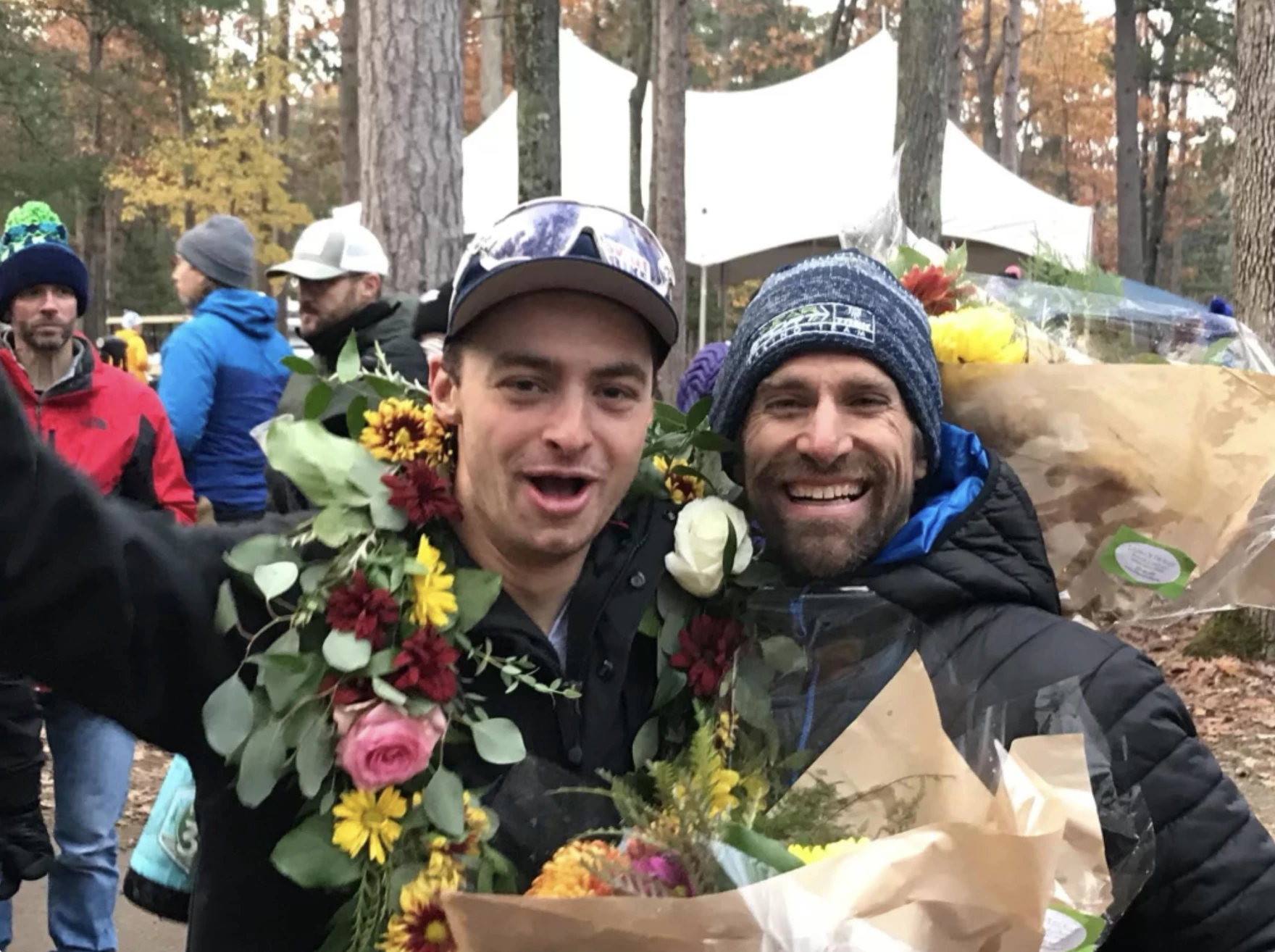
Alexey Vermeulen, left, and Brian Matter, right. (courtesy: Alexey Vermeulen)
Catch more news at Great Lakes Now:
Points North: The Biggest Buck That Maybe Never Was
Featured image: Alexey Vermeulen sprints up Icebreaker Hill at the Iceman Cometh Challenge in 2019. He took home his first win at Iceman that year. (courtesy: Alexey Vermeulen)



